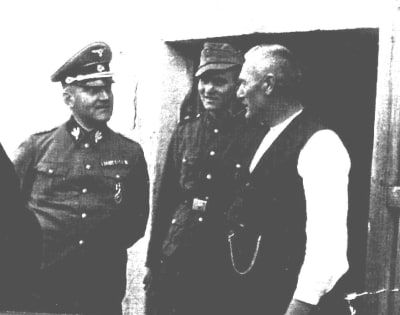English
In the year 1939 SS-General Gottlob Berger visits Bergersdorf, a German village situated in the Protectorate of Bohemia and Moravia which was occupied by Hitler's Wehrmacht during World War II. Because of the identity of names he declares this village as "his" village and awards it the title "SS-Village".

Herma Kennel tells this strange story in her documentary novel BergersDorf published 2003 by Vitalis-Verlag Prague, and in Czech language 2011 by PASEKA Prague. She also describes the everyday life in this village and in the German speaking "language island" Iglau (Jihlava) in the centre of Czech Republic during Nazi-occupation 1939 - 1945: The Germans who had been living in Bohemia for 700 years celebrated the German Wehrmacht wholeheartedly as liberators. In the county town Iglau nearby Bergersdorf an attempt to assassinate Hitler is sniffed out, arrests are made, the synagogue is set on fire. The mayor of Bergersdorf, the farmer Wenzel Hondl, a honest man, gets involved. He is asked to join the "Allgemeine SS", must accompany the Gestapo in arresting the Czech miller. By and by the scenery in Bergersdorf grows gloomier, as the number of announcements of soldiers killed in action increases. Finally in May of 1945, after the end of the war, Czech "guerrillas" take revenge and, among other German farmers, brutally murder Wenzel Hondl.
BergersDorf is the third novel by Herma Kennel. Her first novel Alleingang (Luchterhand - Literaturverlag 1991) recounts the life of an East German who, to make a better living, fled to West Germany and Switzerland. Butafter getting increasingly lonely he commits suicide. In her second novel Es gibt Dinge, die muß man einfach tun (Verlag Herder-Spektrum 1995) Herma Kennel describes the resistance efforts of Radu Filipescu, a young Rumanian engineer, against the Ceauscescu-regime. This book has been translated into Romanian language ("Joggging cu Securitatea", Bucharest 1998, republished by POLIROM (Bucharest 2009) and honoured by the Georghe-Ursu Human Right award.
2008 another book Die Welt im Frühling verlassen (To Leave the World in Springtime) was published by Vitalis Verlag. In this documentary novel Herma Kennel narrates the story of a group of young Czech resistance fighters 1944/45 (named after General Luza) which was wiped out by German Gestapo. It is a harrowing story about courage, fight and treason but also about a love relationship during wartime.
Moreover, Herma Kennel has written several books for children (total number of copies published: 450 000), illustrating them herself as well. She has also exhibited her paintings (Naive Style) - including a greeting card for UNICEF - in several European cities.